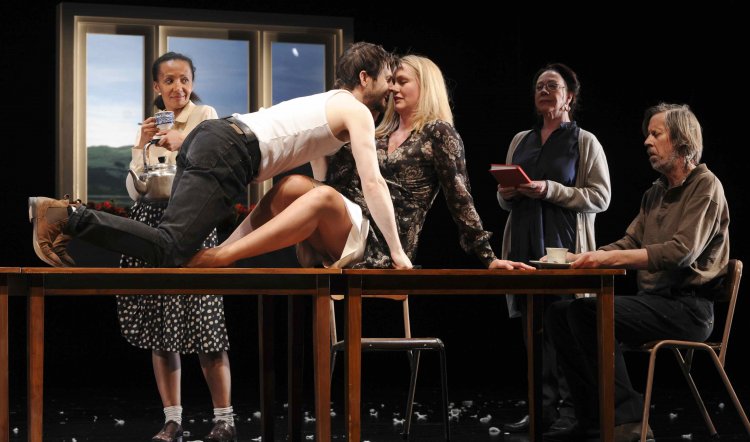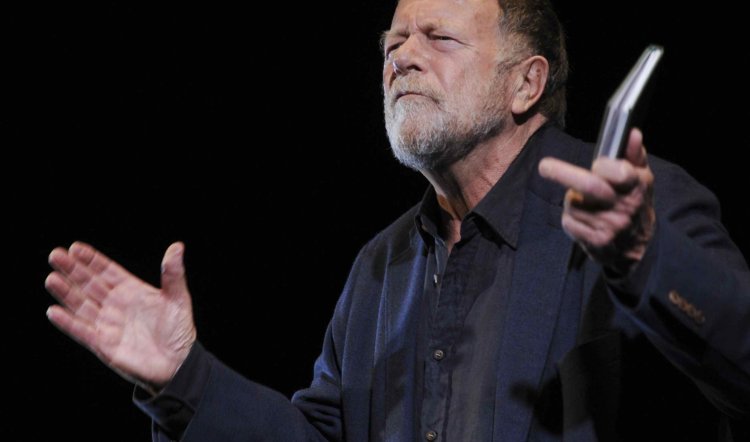
UNDER MILK WOOD: A PLAY FOR VOICES
UNDER MILK WOOD - a play for voices, Sydney Theatre Company at the Drama Theatre, Sydney Opera House, May 27-July 7, 2012. Photos by Heidrun Löhr, main photo: Paula Arundell, Cameron Goodall, Helen Thomson, Sandy Gore and Bruce Spence; thumb pic: Jack Thompson.
DYLAN THOMAS'S 1954 radio play is a classic of the genre - steeped in vivid imagery and some of the quirkiest, funniest, richest and most insightful poetry in the English language. Although it has been "adapted" for the stage since then, it's still a tricky piece to transform from the imagination to the concrete. Director Kip Williams, designer Robert Cousins and lighting designer Damien Cooper have, between them, achieved a difficult balance between visual pleasures and interest and not distracting from or undermining the text. A bare black box allows Jack Thompson to open the night with the scene-setting monologue of the Narrator. His distinctive craggy-honeyed voice wraps around the many-layered portrait he paints of Llareggub, a sleeping, sleepy village that could be anywhere but happens to be in Wales.
It's a wonderfully wrought introduction; Thompson clad in black in the black space, moving slowly to the front of the stage, warm lighting highlighting in gold his bearded face and right hand (in his left he holds the playscript). It's a mesmerising, expressive hand, that right hand, conjuring images and people out of the air with tender gestures. It's a magician's hand, enabling other things to happen on stage while the audience's attention is wrapped in the voice and the small movements.
"…You can hear the dew falling, and the hushed town breathing," he says softly. "Only your eyes are unclosed to see the black and folded town fast, and slow, asleep. And you alone can hear the invisible starfall, the darkest-beforedawn minutely dewglazed stir of the black, dab-filled sea where the Arethusa the Curlew and the Skylark, Zanzinbar, Rhiannon, the Rover, the Cormorant, and the Star of Wales tilt and ride…"
It is spectacularly lovely stuff and he does it beautifully. Within minutes, Second Voice (Sandy Gore) seamlessly segues into the story-telling, her famously mellifluous tones and perfect diction softened and moulded into the service of the glorious but difficult phrasing. It's a role made for her and she plays it - and others - with elan, understanding and lovely judgement.
The other members of the cast take on the roles and voices of Llareggub's motley citizenry of some 70 characters, mostly with success. On opening night young Ky Baldwin (sharing with Alex Chorley) was a delightful Little Boy, young Captain Cat and so on. Paula Arundell and Helen Thomson excel as the full range of the sexpot-fleshpot spectrum. There's the lusty but grieving Polly Garter and career virgin Myfanwy Price (Arundell); and Captain Cat's "sumptuous tart" Rosie Probert and titillating chintz of Gossamer Beynon (Thomson). While Sandy Gore as the purse-lipped Mrs Ogmore-Pritchard is a delight. She dreams of ruling the roosters - (Bruce Spence and Drew Forsythe) both late and henpecked husbands - with obsessive attention to cleanliness and tidiness that reaches its apotheosis in the fabled line, "And before you let the sun in, mind it wipes its shoes."
There is one oddly weak link in the cast, it has to be said, and it's musical director and composer Alan John. Although the incidental music, choral interludes and songs he's composed for the play are fine, he is also in the play as a half dozen characters including Organ Morgan and Jack Black. Unfortunately he speaks his lines with all the clarity of a man with a mouthful of popcorn and he manages to inject about as much depth as popcorn into his every action. It is odd that managements persist in casting him in acting roles when he is so obviously a musician.

In the program there is an essay by William Christie: Full as a Lovebird's Egg - women, sexuality and relationships in Under Milk Wood, which is self explanatory in that it's a discursive exploration of the playwright's background and motivations. Indirectly it suggests why the women are such a powerful presence and why their men - variously portrayed by those already mentioned as well as Cameron Goodall and Drew Livingston - tend to get the rough end of the pineapple. He also writes, "Before anything else, Under Milk Wood is a comedy of sex. Although Kenneth Tynan's classifying the play as a 'comedy of humours' is arguably more accurate, every incident, every relationship, every aside in this pastoral fantasy is shapes by eros, and never more so than when a character abstains or abominates."
Director Kip Williams has accomplished much with this production since taking over from the internationally gallivanting Andrew Upton and one choice in particular has been crucial to its success. Dumping the Welsh accents that might have been expected of this most Welsh of Welsh plays and going with a variety of Australian voices does several things - all of them good. For a start the novelty value of the sing-song sound of Wales is done away with so the text is heard and understood in all its beauty, poignancy and wicked humour. It also means the audience isn't obsessively listening for those actors who can "do" the Welsh and those whose grip on it slips and slides - which always detracts from the slightest play and in this one, would be a disastrous distraction. Most significantly though, is that while the play takes place in the seaside village of Llaregub, it really could be anywhere and its populace is instantly recognisable.
Revealed in this production, therefore, through the voices and the consequent grounding in a solid "somewhere" is its universality and toughness. The quaint and cute aspects of what, to Australian ears, are the main attraction of the Welsh accent are entirely missing, and gone with it is the layer of sugar. This is actually a tough play, yet one with a heart that deserves more than merely winsome treatment.
Christie writes in his essay that Thomas, "never ceased his satirical campaign against the smug righteousness and sexual hypocrisy of provincial Wales … there is no illusion of social harmony here in this not-so-golden world where the unlikely earth-mother, Polly Garter, will never share in the dance at the ironically named Welfare Hall. However, rather than resort to a Bohemian indignation that found self-righteousness with a self-righteousness of its own, Thomas sought in the end to bring out the potential in the imagination of all of us for what in the poem 'This Side of Love' he called 'unjudging love'."
While there was some unevenness and nerves on opening night, Kip Williams and his cast and crew have achieved that unjudging love in the most judicious way. If you've never seen Under Milk Wood, and chances are you haven't, you'll probably not have a better opportunity to experience it than this. And if you still bang on about Richard Burton - do stop.



